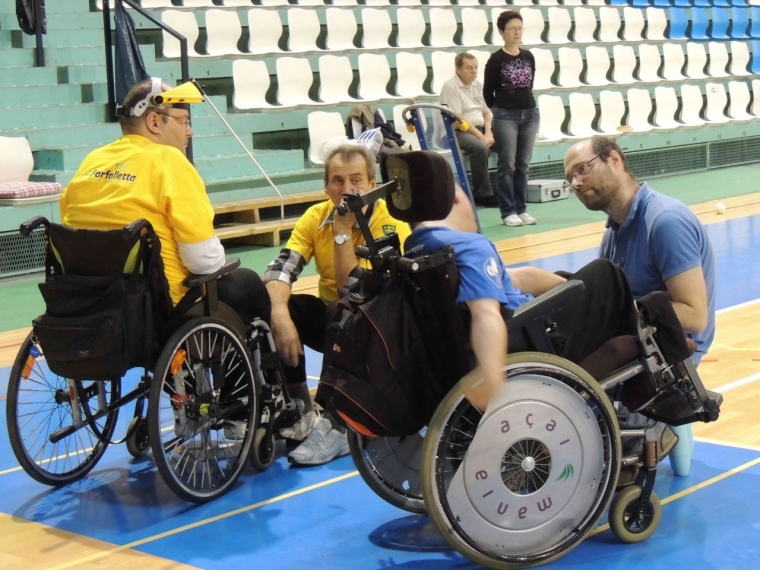How would you describe boccia for people who don’t know anything about the sport?
Boccia is, to a large extent, a strategic game. You don’t just play it using your body, but primarily using your brain. The game is played on a flat interior surface using leather balls filled with plastic pellets. The competing players each have their own set of balls – one red and the other blue. The most important ball in the game is the jack – a white ball that is thrown anywhere in the playing field, which has a size of 6×10 meters. The players’ goal is to throw the balls as close to the jack as possible. The player who manages to get more balls close to the jack wins. That’s the basic principle of the game.
Boccia can be divided into two separate “worlds” that partially overlap with each other – classic competitive boccia and recreational integrated boccia. Integrated boccia can be played by anybody, no matter if the person has a disability or not, so it’s played by people old and young, in wheelchairs and without them, with both strong hands and weak ones. Classic competitive boccia can only be played by people who have passed a strict classification process performed by a medical doctor, proving that they meet a number of requirements. For instance, all classified boccia players must be quadriplegic.
I have heard several people say that boccia is boring. On the other hand, I’ve also seen spectators who watched boccia matches with complete focus while others were beside themselves with emotion.
Yes, all you need is to spend a while as a spectator and watching boccia can easily turn into a hobby. One time when I was watching a game between globally top-ranking boccia players, I found myself thinking: “This is no longer just about sports – this person has elevated boccia to an art form.” And that’s exactly true. As a spectator, you try to solve game situations in your head, but your solution is often completely different from what the player actually does. All that’s left then is shake your head and admit: “I didn’t even imagine a move like that was possible.”
Let’s look at other “boring” sports similar to boccia that people are more familiar with: pool, for instance. Sports channels could broadcast pool matches between top players for hours on end. And I’m certain they have their audience. They wouldn’t be broadcast otherwise. The game involves tension, calmness, an interesting atmosphere and astonishment at the feats people are capable of. The same is true for boccia.
Another change in attitude comes when you get the opportunity to hold a boccia ball in your own hands and try to throw it towards the target. Even if you were a bored spectator before, you suddenly realize that landing a good throw is not as easy as it looks. It irks you a bit: “How come I missed? This can’t be right.” And just like that, the boredom you felt previously is gone.
“If we compared competitive boccia to a river, we could say that it has many tributaries and it divides into many branches in its delta. In other words, competitive boccia is just one aspect of the sport. Many more people play boccia simply because they enjoy it, they find it relaxing or they use it as a form of physical therapy.”
Competitive boccia is played in several classes. Could you describe them?
There are big differences between classified players when it comes to their level of physical impairment. In order to make the competing players’ chances of winning similar, four classes have been established: BC1, BC2, BC3 and BC4. BC1 and BC2 include players diagnosed with cerebral palsy. The BC1 class is meant for players with a severe level of impairment, meaning that they need an assistant to play, while BC2 is for players with a mild form of impairment who can play by themselves.
The BC3 and BC4 classes include players with various diagnoses (except cerebral palsy), such as post-traumatic disabilities, multiple sclerosis, muscular dystrophy, myopathy or muscle atrophy. The BC3 class consists of players with severe disabilities – they need an assistant and a boccia ramp, which is a special assistive device – while the BC4 class consists of players with milder disabilities. Sports assistants are an integral part of the game in the BC1 and BC3 classes.
Then there is BC5, a new class which includes players with relatively mild physical disabilities. So far, BC5 can only be played competitively on a national level.
What are boccia assistants for?
I think this is another thing that makes boccia a unique sport – each athlete needs an assistant that makes playing the game possible. In the BC3 class, having an assistant who is able to cooperate with the player is winning half the battle. The player’s assistant in the BC3 class adjusts the boccia ramp (a slide used to deliver the player’s balls) to the desired direction and angle, enabling the player to launch the boccia ball towards the jack. The player’s assistant in the BC1 class helps by adjusting the player’s wheelchair to the desired position and direction, handing the ball to the player, adjusting the seating position and holding the wheelchair during the throw to prevent it from wiggling.
An important rule is that the assistant is prohibited from initiating communication, except cases when it is absolutely necessary. Unnecessary communication from the assistant is penalized. This means that the assistant serves as a relatively passive tool available at the player’s disposal, carrying out the player’s instructions. The assistant’s passivity can be illustrated by a rule in the BC3 class which states that the assistant must stand with his or her back facing the playing field, thus preventing the assistant from following the game and interfering with it. In the BC1 class, the assistant does see the playing field, but has to stand behind the back line of the playing box and may only assist upon the player’s request. The player usually does this by raising his or her hand.

Ondrej and Rudy. Photo: Ondrej Bašták Ďurán’s archive
So how can the assistant carry out the player’s instructions?
Of course, there needs to be some amount of communication between the player and the assistant. This is usually one-way communication from player to assistant, but it can also take on other forms. For instance, the assistant can use slight gestures to discreetly communicate with the player, but some players also have speech disorders in addition to physical disabilities. In extreme cases, they might be completely unable to speak, which means that non-verbal communication needs to be used – gestures, facial expressions or pictograms.
It seems that assistants in this class have a lot of duties.
Assistants in the BC3 class need to be good at communication, while also being empathetic, skilled and at least somewhat knowledgeable about the technical aspects of handling a boccia ramp. These are tough requirements, which is why we are experiencing such a lack of assistants in the BC3 class. In the Slovak context, this means that players are willing to enter important tournaments with anybody as their sports assistant just to be able to participate. Maybe they will strike it lucky and achieve a good result even though the assistant is inexperienced. But this is not something top players can afford to do. In an ideal world, every player would have the same assistant to train and play with for years. Only then is it possible to achieve international success. Otherwise, there is no way to make any real progress.
Boccia is played with a time limit, which means that players have a limited amount of time to throw all their balls. Good assistants are very well aware of the fact that every second is precious. They wouldn’t make a single unnecessary move. A good assistant follows the player’s instructions, but the actions themselves are practiced so often that the assistant just uses his or her muscle memory without even having to think about them: adjusting the ramp’s direction, attaching the extension, picking the right ball, placing it at the correct height, attaching the helmet head-pointer which is used to launch the ball from the ramp, stepping aside to give the player a good view, stabilizing the ramp and passing instructions to the referee. Assistants like these deserve to wear medals just as much as their players if they win. This is why BC3 assistants receive medals at every reputable tournament.
We have been talking about sports assistants. Are they any different from personal assistants? Let’s try to clear things up.
Every personal assistant can also be a sports assistant in the BC1 or BC3 class, so many players’ personal assistants also serve as their sports assistants. They train, attend tournaments and travel to international sporting events together.
You could say that a boccia player, no matter the class, is dependent on some form of personal assistance. Players with milder disabilities might only need personal assistants to take them to training sessions, while players with more severe disabilities need assistants to help them with nearly everything – from sports assistance to personal hygiene, getting dressed and eating.

“I once witnessed incredible cooperation, or more fittingly coordination between a BC3 player and his assistant. I watched it with as much admiration as I would a ballet or a gymnastics performance. The harmony between player and assistant can be breathtaking,” says Ondrej Photo: Roman Benický
You yourself were a sports assistant in the BC3 class. What experience do you have from this period?
I think that my greatest success as a BC3 assistant was receiving gold medal at Boccia Masters – the most prestigious boccia tournament in Slovakia that is only attended by the best players in the national rankings. I received the medal as the assistant of Rudy Krajčír. Rudy got the wildcard because a higher-ranking player could not attend the event and the organizers urgently needed a replacement.
Rudy and I spent the whole year training hard. I would regularly visit him at the Integra social services home in Bratislava and we would train in the common room, where we had marked out the lines of a boccia playing field on the floor. What’s interesting about it is that Rudy had the most severe disability of all the competing players. In addition to being a spastic, the constant spasms preventing him from playing comfortably, he cannot communicate verbally either. Otherwise, he’s a grown man with a healthy mind, so our communication using pictograms allowed his wit to stand out. I feel that few people thought Rudy had a chance to succeed. This helped me realize that you can really achieve a lot if you train hard.
How did your time together continue?
I later stopped being Rudy’s assistant because my life path was headed in a different direction. Rudy spent a lot of time thinking back to our time together and he wanted me back as his assistant, but that wasn’t possible anymore. So, Rudy took a break from boccia for several years. Finding a suitable assistant for him was incredibly difficult. That’s why I was very happy last year when I met him at a league tournament in Turie. He was there with a new assistant who seemed versatile enough for the role.
Being Rudy’s assistant was great because I had the opportunity to meet his family – his mother, father and sisters. They would all attend tournaments with him. They provided him with incredible support and it also allowed me to focus on his athletic performance. During the break between matches, his “personal assistants” would take over. This is what the ideal situation is like. A player’s personal assistant looks after the player’s comfort outside the playing field, and the sports assistant takes over during the match.
“Integrated boccia can be an effective teambuilding tool. It can be utilized by companies, agencies and various other teams that need to hold together and promote good relationships.”
As a coach, you also work with integrated boccia. What makes it different?
Integrated boccia means that the players don’t need to be classified. They can play it as singles, doubles or teams. In the spirit of integration, everyone plays together – classified boccia players, their assistants, parents, siblings and even random visitors. Team games are played with three players per team. This is the most dynamic version of boccia. In a team game, players can discuss their strategy before throwing the ball, communicate and cheer for one another. Each of the players sees the target from a slightly different launch angle, so it’s important to pick the player who has the best view of the target.
In addition to providing a sporting experience, team games also promote social inclusion. They can be a very effective teambuilding tool. When supervised by a coach, they can be utilized by companies, agencies and various other teams that need to hold together and promote good relationships.
Boccia breaks down physical, mental or emotional barriers. It changes the way people perceive each other, especially those who are different by being in a wheelchair. This is something I’ve experienced many times. The great atmosphere that’s inevitable with team games works like a charm, even for the most obstinate people.
Don’t you feel that the game has moved far from just being about blue, red and the jack?
Perhaps we should look at boccia as an important outcome of the human struggle to create a better world. We as human beings have been able to create a tool that enables people with severe disabilities to live a fuller life. Boccia players need to prove their skill and wits. They get to have fun and stand against people from other countries, without being forced to do so by some military conflict. Boccia motivates people to come and show others what is inside them despite their physical limits. It’s an exciting path that the game’s creators laid out for those of us who keep encountering closed doors due to physical disabilities. Boccia allows people who are completely paralyzed from the neck down to become Paralympic medalists. And that’s no small thing.
This is the ultimate goal in boccia, just like in any other sport. It requires training, effort, strong motivation and strong-mindedness. Players need to join forces with their assistants, coaches, sports psychologists and parents. They need to fundraise to be able to pay for their starting fees, equipment, as well as its constant testing and improvement. They also need new ideas and strategies, while also improving their technique. Simply said, boccia allows committed players to live a fuller life.

The 2019 Slovak championship of singles and doubles. Photo: Roman Benický
Are we aware of this in Slovakia?
From my perspective, it’s a paradox that while boccia has great potential, awareness about the sport in our country is low. Keeping in mind that it was introduced as a Paralympic sport as early as 1984, saying “these things take time” is simply a bad excuse. So why is there little to no media coverage about boccia and the successes of our athletes? After all, our boccia players have placed Slovakia among the most successful boccia nations. How long will our society continue to dance around the topic of people with severe disabilities?
After all, this isn’t just about boccia – it’s a topic that concerns all of our society. It’s not just sidewalks with high curbs that make them inaccessible by wheelchair, it’s also the fact that each and every one of us can at some point end up dependent on a wheelchair and the care of others, even if it is simply due to old age.
“Personal assistance unleashes a great potential with a society-wide reach. Instead of seeing a person who needs care, you suddenly see a person who creates value.”
Even though we’re talking about boccia, you’re frequently mentioning personal assistance. How would you describe it to someone who has never heard of the concept?
I think that Slovakia made a good decision by establishing the system of personal assistants. The neighboring countries do not have any legal provisions like this. I spent a long time working as a personal assistant to many people, with no connection to boccia whatsoever. Personal assistants enable people with disabilities to live their lives fully and independently.
Many people think that personal assistants are useless and people with disabilities could simply get help from their parents. But they are gravely mistaken. I think that people would change their opinion if they had the opportunity to step into the shoes of these parents for a week. Being alert 24/7 is extremely exhausting, even if you are strongly motivated by your love for your child. We all need a moment for just ourselves, allowing us to relax and focus on something other than caring for somebody.
In this regard, personal assistants are irreplaceable for both people with disabilities and the people they depend on. The system unleashes a great potential with a society-wide reach. Instead of seeing a person who needs care, you suddenly see a person who creates value – for instance if having a personal assistant allows people with disabilities to become economically active. It also allows their caregivers to focus on a range of other activities that are beneficial for society, instead of limiting their activities to helping the people who are dependent on them. I don’t think that personal assistants get the recognition they deserve in our country. Unfortunately, this is something they have in common with boccia.
Thank you for the interview.
Ondrej Bašták Ďurán has a degree in biomedical physics from Comenius University in Bratislava. In the past, he worked as a personal and sports assistant to many people with disabilities. In 2013, he established BASHTO SPORTS, a company that makes and sells boccia equipment. He exports his products to more than 30 countries on 5 continents. He has written a manual on boccia training, which has been published in Slovak and English. He also works as a boccia coach and sporting event organizer.
Boccia is, to a large extent, a strategic game. You don’t just play it using your body, but primarily using your brain. The game is played on a flat interior surface using leather balls filled with plastic pellets. The competing players each have their own set of balls – one red and the other blue. The most important ball in the game is the jack – a white ball that is thrown anywhere in the playing field, which has a size of 6×10 meters. The players’ goal is to throw the balls as close to the jack as possible. The player who manages to get more balls close to the jack wins. That’s the basic principle of the game.
Boccia can be divided into two separate “worlds” that partially overlap with each other – classic competitive boccia and recreational integrated boccia. Integrated boccia can be played by anybody, no matter if the person has a disability or not, so it’s played by people old and young, in wheelchairs and without them, with both strong hands and weak ones. Classic competitive boccia can only be played by people who have passed a strict classification process performed by a medical doctor, proving that they meet a number of requirements. For instance, all classified boccia players must be quadriplegic.
I have heard several people say that boccia is boring. On the other hand, I’ve also seen spectators who watched boccia matches with complete focus while others were beside themselves with emotion.
Yes, all you need is to spend a while as a spectator and watching boccia can easily turn into a hobby. One time when I was watching a game between globally top-ranking boccia players, I found myself thinking: “This is no longer just about sports – this person has elevated boccia to an art form.” And that’s exactly true. As a spectator, you try to solve game situations in your head, but your solution is often completely different from what the player actually does. All that’s left then is shake your head and admit: “I didn’t even imagine a move like that was possible.”
Let’s look at other “boring” sports similar to boccia that people are more familiar with: pool, for instance. Sports channels could broadcast pool matches between top players for hours on end. And I’m certain they have their audience. They wouldn’t be broadcast otherwise. The game involves tension, calmness, an interesting atmosphere and astonishment at the feats people are capable of. The same is true for boccia.
Another change in attitude comes when you get the opportunity to hold a boccia ball in your own hands and try to throw it towards the target. Even if you were a bored spectator before, you suddenly realize that landing a good throw is not as easy as it looks. It irks you a bit: “How come I missed? This can’t be right.” And just like that, the boredom you felt previously is gone.
“If we compared competitive boccia to a river, we could say that it has many tributaries and it divides into many branches in its delta. In other words, competitive boccia is just one aspect of the sport. Many more people play boccia simply because they enjoy it, they find it relaxing or they use it as a form of physical therapy.”
Competitive boccia is played in several classes. Could you describe them?
There are big differences between classified players when it comes to their level of physical impairment. In order to make the competing players’ chances of winning similar, four classes have been established: BC1, BC2, BC3 and BC4. BC1 and BC2 include players diagnosed with cerebral palsy. The BC1 class is meant for players with a severe level of impairment, meaning that they need an assistant to play, while BC2 is for players with a mild form of impairment who can play by themselves.
The BC3 and BC4 classes include players with various diagnoses (except cerebral palsy), such as post-traumatic disabilities, multiple sclerosis, muscular dystrophy, myopathy or muscle atrophy. The BC3 class consists of players with severe disabilities – they need an assistant and a boccia ramp, which is a special assistive device – while the BC4 class consists of players with milder disabilities. Sports assistants are an integral part of the game in the BC1 and BC3 classes.
Then there is BC5, a new class which includes players with relatively mild physical disabilities. So far, BC5 can only be played competitively on a national level.
What are boccia assistants for?
I think this is another thing that makes boccia a unique sport – each athlete needs an assistant that makes playing the game possible. In the BC3 class, having an assistant who is able to cooperate with the player is winning half the battle. The player’s assistant in the BC3 class adjusts the boccia ramp (a slide used to deliver the player’s balls) to the desired direction and angle, enabling the player to launch the boccia ball towards the jack. The player’s assistant in the BC1 class helps by adjusting the player’s wheelchair to the desired position and direction, handing the ball to the player, adjusting the seating position and holding the wheelchair during the throw to prevent it from wiggling.
An important rule is that the assistant is prohibited from initiating communication, except cases when it is absolutely necessary. Unnecessary communication from the assistant is penalized. This means that the assistant serves as a relatively passive tool available at the player’s disposal, carrying out the player’s instructions. The assistant’s passivity can be illustrated by a rule in the BC3 class which states that the assistant must stand with his or her back facing the playing field, thus preventing the assistant from following the game and interfering with it. In the BC1 class, the assistant does see the playing field, but has to stand behind the back line of the playing box and may only assist upon the player’s request. The player usually does this by raising his or her hand.

Ondrej and Rudy. Photo: Ondrej Bašták Ďurán’s archive
So how can the assistant carry out the player’s instructions?
Of course, there needs to be some amount of communication between the player and the assistant. This is usually one-way communication from player to assistant, but it can also take on other forms. For instance, the assistant can use slight gestures to discreetly communicate with the player, but some players also have speech disorders in addition to physical disabilities. In extreme cases, they might be completely unable to speak, which means that non-verbal communication needs to be used – gestures, facial expressions or pictograms.
It seems that assistants in this class have a lot of duties.
Assistants in the BC3 class need to be good at communication, while also being empathetic, skilled and at least somewhat knowledgeable about the technical aspects of handling a boccia ramp. These are tough requirements, which is why we are experiencing such a lack of assistants in the BC3 class. In the Slovak context, this means that players are willing to enter important tournaments with anybody as their sports assistant just to be able to participate. Maybe they will strike it lucky and achieve a good result even though the assistant is inexperienced. But this is not something top players can afford to do. In an ideal world, every player would have the same assistant to train and play with for years. Only then is it possible to achieve international success. Otherwise, there is no way to make any real progress.
Boccia is played with a time limit, which means that players have a limited amount of time to throw all their balls. Good assistants are very well aware of the fact that every second is precious. They wouldn’t make a single unnecessary move. A good assistant follows the player’s instructions, but the actions themselves are practiced so often that the assistant just uses his or her muscle memory without even having to think about them: adjusting the ramp’s direction, attaching the extension, picking the right ball, placing it at the correct height, attaching the helmet head-pointer which is used to launch the ball from the ramp, stepping aside to give the player a good view, stabilizing the ramp and passing instructions to the referee. Assistants like these deserve to wear medals just as much as their players if they win. This is why BC3 assistants receive medals at every reputable tournament.
We have been talking about sports assistants. Are they any different from personal assistants? Let’s try to clear things up.
Every personal assistant can also be a sports assistant in the BC1 or BC3 class, so many players’ personal assistants also serve as their sports assistants. They train, attend tournaments and travel to international sporting events together.
You could say that a boccia player, no matter the class, is dependent on some form of personal assistance. Players with milder disabilities might only need personal assistants to take them to training sessions, while players with more severe disabilities need assistants to help them with nearly everything – from sports assistance to personal hygiene, getting dressed and eating.

“I once witnessed incredible cooperation, or more fittingly coordination between a BC3 player and his assistant. I watched it with as much admiration as I would a ballet or a gymnastics performance. The harmony between player and assistant can be breathtaking,” says Ondrej Photo: Roman Benický
You yourself were a sports assistant in the BC3 class. What experience do you have from this period?
I think that my greatest success as a BC3 assistant was receiving gold medal at Boccia Masters – the most prestigious boccia tournament in Slovakia that is only attended by the best players in the national rankings. I received the medal as the assistant of Rudy Krajčír. Rudy got the wildcard because a higher-ranking player could not attend the event and the organizers urgently needed a replacement.
Rudy and I spent the whole year training hard. I would regularly visit him at the Integra social services home in Bratislava and we would train in the common room, where we had marked out the lines of a boccia playing field on the floor. What’s interesting about it is that Rudy had the most severe disability of all the competing players. In addition to being a spastic, the constant spasms preventing him from playing comfortably, he cannot communicate verbally either. Otherwise, he’s a grown man with a healthy mind, so our communication using pictograms allowed his wit to stand out. I feel that few people thought Rudy had a chance to succeed. This helped me realize that you can really achieve a lot if you train hard.
How did your time together continue?
I later stopped being Rudy’s assistant because my life path was headed in a different direction. Rudy spent a lot of time thinking back to our time together and he wanted me back as his assistant, but that wasn’t possible anymore. So, Rudy took a break from boccia for several years. Finding a suitable assistant for him was incredibly difficult. That’s why I was very happy last year when I met him at a league tournament in Turie. He was there with a new assistant who seemed versatile enough for the role.
Being Rudy’s assistant was great because I had the opportunity to meet his family – his mother, father and sisters. They would all attend tournaments with him. They provided him with incredible support and it also allowed me to focus on his athletic performance. During the break between matches, his “personal assistants” would take over. This is what the ideal situation is like. A player’s personal assistant looks after the player’s comfort outside the playing field, and the sports assistant takes over during the match.
“Integrated boccia can be an effective teambuilding tool. It can be utilized by companies, agencies and various other teams that need to hold together and promote good relationships.”
As a coach, you also work with integrated boccia. What makes it different?
Integrated boccia means that the players don’t need to be classified. They can play it as singles, doubles or teams. In the spirit of integration, everyone plays together – classified boccia players, their assistants, parents, siblings and even random visitors. Team games are played with three players per team. This is the most dynamic version of boccia. In a team game, players can discuss their strategy before throwing the ball, communicate and cheer for one another. Each of the players sees the target from a slightly different launch angle, so it’s important to pick the player who has the best view of the target.
In addition to providing a sporting experience, team games also promote social inclusion. They can be a very effective teambuilding tool. When supervised by a coach, they can be utilized by companies, agencies and various other teams that need to hold together and promote good relationships.
Boccia breaks down physical, mental or emotional barriers. It changes the way people perceive each other, especially those who are different by being in a wheelchair. This is something I’ve experienced many times. The great atmosphere that’s inevitable with team games works like a charm, even for the most obstinate people.
Don’t you feel that the game has moved far from just being about blue, red and the jack?
Perhaps we should look at boccia as an important outcome of the human struggle to create a better world. We as human beings have been able to create a tool that enables people with severe disabilities to live a fuller life. Boccia players need to prove their skill and wits. They get to have fun and stand against people from other countries, without being forced to do so by some military conflict. Boccia motivates people to come and show others what is inside them despite their physical limits. It’s an exciting path that the game’s creators laid out for those of us who keep encountering closed doors due to physical disabilities. Boccia allows people who are completely paralyzed from the neck down to become Paralympic medalists. And that’s no small thing.
This is the ultimate goal in boccia, just like in any other sport. It requires training, effort, strong motivation and strong-mindedness. Players need to join forces with their assistants, coaches, sports psychologists and parents. They need to fundraise to be able to pay for their starting fees, equipment, as well as its constant testing and improvement. They also need new ideas and strategies, while also improving their technique. Simply said, boccia allows committed players to live a fuller life.

The 2019 Slovak championship of singles and doubles. Photo: Roman Benický
Are we aware of this in Slovakia?
From my perspective, it’s a paradox that while boccia has great potential, awareness about the sport in our country is low. Keeping in mind that it was introduced as a Paralympic sport as early as 1984, saying “these things take time” is simply a bad excuse. So why is there little to no media coverage about boccia and the successes of our athletes? After all, our boccia players have placed Slovakia among the most successful boccia nations. How long will our society continue to dance around the topic of people with severe disabilities?
After all, this isn’t just about boccia – it’s a topic that concerns all of our society. It’s not just sidewalks with high curbs that make them inaccessible by wheelchair, it’s also the fact that each and every one of us can at some point end up dependent on a wheelchair and the care of others, even if it is simply due to old age.
“Personal assistance unleashes a great potential with a society-wide reach. Instead of seeing a person who needs care, you suddenly see a person who creates value.”
Even though we’re talking about boccia, you’re frequently mentioning personal assistance. How would you describe it to someone who has never heard of the concept?
I think that Slovakia made a good decision by establishing the system of personal assistants. The neighboring countries do not have any legal provisions like this. I spent a long time working as a personal assistant to many people, with no connection to boccia whatsoever. Personal assistants enable people with disabilities to live their lives fully and independently.
Many people think that personal assistants are useless and people with disabilities could simply get help from their parents. But they are gravely mistaken. I think that people would change their opinion if they had the opportunity to step into the shoes of these parents for a week. Being alert 24/7 is extremely exhausting, even if you are strongly motivated by your love for your child. We all need a moment for just ourselves, allowing us to relax and focus on something other than caring for somebody.
In this regard, personal assistants are irreplaceable for both people with disabilities and the people they depend on. The system unleashes a great potential with a society-wide reach. Instead of seeing a person who needs care, you suddenly see a person who creates value – for instance if having a personal assistant allows people with disabilities to become economically active. It also allows their caregivers to focus on a range of other activities that are beneficial for society, instead of limiting their activities to helping the people who are dependent on them. I don’t think that personal assistants get the recognition they deserve in our country. Unfortunately, this is something they have in common with boccia.
Thank you for the interview.
Ondrej Bašták Ďurán has a degree in biomedical physics from Comenius University in Bratislava. In the past, he worked as a personal and sports assistant to many people with disabilities. In 2013, he established BASHTO SPORTS, a company that makes and sells boccia equipment. He exports his products to more than 30 countries on 5 continents. He has written a manual on boccia training, which has been published in Slovak and English. He also works as a boccia coach and sporting event organizer.














